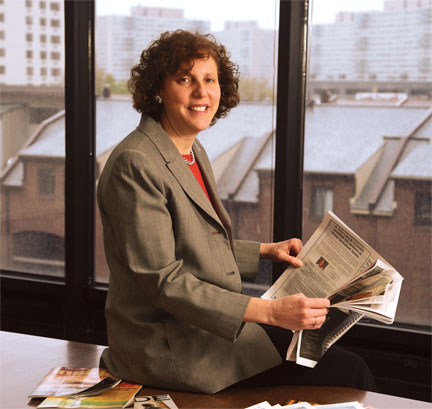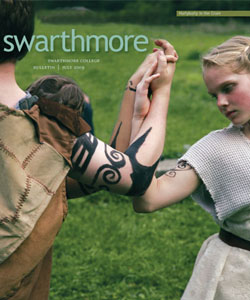Bashert
Lisa Hostein ’83 is Changing the Image of Philadelphia’s Venerable Jewish Newspaper by Including New Voices.
Although the Yiddish word bashert is typically understood in the romantic sense of “finding one’s predestined soul mate,” the word more literally translates to “destiny.” Lisa Hostein, executive editor of the Jewish Exponent, the Philadelphia area’s Jewish newspaper, seems to have found both her occupational and personal bashert at the publication. In 1983, she worked as an intern at the paper and, after Swarthmore, was a reporter and news editor there for nearly 11 years. She also met her husband, attorney Joel Oshtry—to whom she’s been married for 23 years—through the Exponent’s personal ads (the predecessor to online dating). They have two sons Ezra, 11, and Sam, 8.
In mid-1994, Hostein was named editor of the Jewish Telegraphic Agency (JTA) in New York, where she plied her skills for 14 years. JTA is a nonprofit global news service that provides news to Jewish community newspapers and other media outlets around the world.
In January, when she returned to lead the Exponent, Hostein’s long train commute to New York City turned into a 20-minute drive from her home in Bala Cynwyd to Philadelphia, often carpooling with her husband. Along with her new position has come the challenge of revitalizing the 122-year-old weekly newspaper. Her primary goal is to expand the readership, reaching Jews across the demographic, political, and religious spectra.
“I wanted to come back and make a difference in my community,” says Hostein, who was born in New York and grew up in Rhode Island but calls the Philadelphia area home. “The Jewish media is good for community building. The paper should both speak to Jews and educate them.”
Hostein says Swarthmore was instrumental in shaping her awareness of the importance of community. “It taught me about different ways of thinking about the world,” she says. “Swarthmore taught me to negotiate, assert myself, fight for a particular issue, challenge ideas, and formulate my own views.” As a student, her strong commitment to Israel prompted her to help form Swarthmore Activists for Israel, which focused on issues surrounding the first war with Lebanon. In her junior year, she created her own independent-study seminar on Zionism with Kenneth Sharpe, William R. Kenan Jr. Professor of Political Science. In the mid-1980s, Hostein lived in Jerusalem for just over one year, studying at the Pardes Institute of Jewish Studies, working as a freelance journalist, and traveling throughout the region.
Hostein’s soft-spoken manner belies her serious commitment to covering tough issues and publishing controversial content in the Exponent. After only three months as executive editor, she ran a front-page article on people who are young, gay, and passionate about their Jewish faith. She also sought out pro and con perspectives on a Jewish organization that protests in Philadelphia against the actions of Israel in its conflict with the Palestinians.
“When I approached the group—which is against Israel’s actions—about writing a piece, you could tell they weren’t used to being included,” she says. “It was an opportunity to engage in communal conversations on tough issues. If a paper can’t address these issues, it won’t be relevant.”
Surveys show the average age of Exponent readers is 57. Hostein would like to see this number settle in the range of 40- to 45-year-olds and wants to expand coverage to reach out to the 18- to 35-year-old market. Other plans include overhauling the paper’s Web site (www.jewishexponent.com), making it more interactive by including blogs, polls, photographs, and a more extensive community calendar.
To measure whether the paper, which currently has a circulation of 40,000, is achieving its desired results, Hostein will conduct readership surveys. “But the best feedback I’ve gotten so far is from people who say, ‘I haven’t read the paper in a long time, but now, I hear people talking about it again. I feel like I’m missing something.’ To be relevant—that’s the supreme compliment, says Hostein, who heads an editorial staff of nine.
“It’s great to have come full circle and be back in the thick of exciting issues and challenging debates,” Hostein says. “As a community, we should have vibrant discussions about issues that matter—or we will stagnate. With all the obstacles and changes the Jewish community faces, we persevere, all while still holding onto the important traditions.”
 Email This Page
Email This Page
